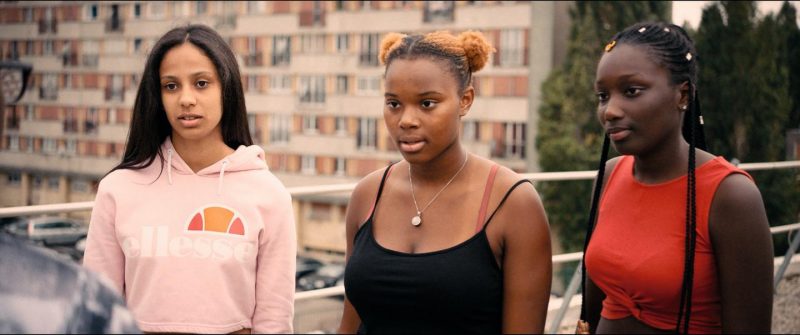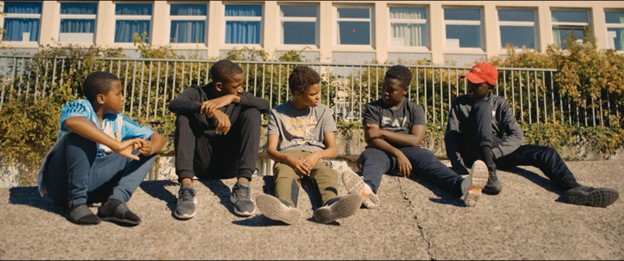Les Miserables
Sight and Sound‘s Elena Lazic interviewed Ladj Ly soon after the UK release of Les Miserables in 2020.
Most people discovered you through Les Misérables, but you’ve been making films for a long time. Can you tell me about your work with the collective Kourtrajmé?
Kourtrajmé is, before anything else, a group of friends. We all grew up together. We’ve known each other since kindergarten or primary school.
The collective was formed in 1994 with the ambition to make our own films. I joined in 1996. I was close friends with Kim Chapiron as a kid. I started as an actor in his films, and then at 17, I bought my first video camera and began filming my neighbourhood.

Les Misérables
Some of the other Kourtrajmé members have moved towards music videos and work outside the banlieue, but in your short films, you focus on the banlieue in a documentary style. Why this desire to stay?
Because that is where I am from. Unlike my friends from Kourtrajmé who live in Paris, I grew up in the banlieue, in Montfermeil. It’s very dear to my heart, and there are so many stories to tell there that I’ve made it my specialty, in a way. Or at least, what I know of it.
And there is also an urgency to this. There are so many issues to tackle that I think I could make films about the banlieue for at least ten more years.
The short films you made with Kourtrajmé were posted online. Was this a choice, or out of necessity?
A kind of cinema had to emerge somewhere, because we’re not on producers’ radars or financed by any organisations. There comes a point where we have to do it all ourselves. Kourtrajmé was born because we couldn’t recognise ourselves in French cinema. So we decided to make our own films, with our own stories, our own actors.
It just so happened that, when we started making films, it was the very beginning of the digital age. Digital cameras had just appeared and for the first time, people had access to the internet at home. We realised that the internet was a great space to broadcast our films. Dailymotion and YouTube didn’t exist yet. We had a Kourtrajmé website where we would post our videos, and they would be very successful.
I’ve always held on to this concept where I would make my films independently. Even my documentaries, they were always censored by TV channels, they didn’t want them as they were, so I put them online for free. I never made money with my films, and I always worked that way.
Why the decision to include and to start with the policemen’s point of view?
I wanted to surprise the audience. With all the work that I’ve done, no one expected me to tell this story from the perspective of the policemen. It’s the surprise of making a film that does not take sides and does not judge, only presents a situation as justly as possible. That’s also what makes the film strong: it describes a reality.
It was important for us to say that the ‘misérables’ are everybody – the inhabitants, the police… all the people in this universe.
How did you strike a balance between denouncing this reality and opening up a conversation?
It’s a politically engaged film. I have something to say: I’m not just making a film to make a film, but because I want to move the lines. The idea behind [the film’s] open ending is that it might make people think and start a debate.
And that is what is happening. Whether we like it or not, the film is a tool. It makes people talk, it changes things. Lots of things are being reconsidered. The film was seen by more than two million viewers in France. The government said they wanted to improve the living conditions in the banlieue after seeing the film. These are only words for now, but still, things are happening.
It’s interesting that the film gives us the point of view of a policeman coming from the provinces – a total outsider. Oftentimes, the policemen who arrive in these neighbourhoods are just out of school or don’t have a lot of experience, and most of them come from the provinces. I thought it would be interesting to tell this story from the perspective of this man who will discover this world at the same time as the viewer.
Unfortunately, most people who don’t live in the banlieue only know it through the media and through politics – most of them have never been. It was important to try to make people understand what the banlieue is really like, so that they wouldn’t immediately jump to clichés or fantasies.
You filmed the real-life protests in the banlieue in 2005, which fed into your short documentary 365 Days in Clichy-Montfermeil [2007]. What differing impacts do you think fiction films and documentaries have?
I don’t really separate the two. If I make a film, it’s because I have something to say. A few years ago, I found myself filming a moment of police brutality – I saw first-hand all the consequences of that. I thought it would be interesting to bring it to the realm of fiction. Les Misérables is fiction, but its impact remains as strong. Whether it’s documentary or fiction, the message goes through, and that’s what’s important.
You also made a documentary called 365 days in Mali [2014] and you’ve said you want to make films in Africa. Is this still something you are pursuing?
Yes, it’s a desire I’ve had for a long time. We’re setting up a Kourtrajmé film school in Senegal in September. We want to have a presence in Dakar, to form this generation of filmmakers and develop projects there.
And you’ve opened a film school called Kourtrajmé in Montfermeil too.
Yes. If we want French cinema to change and to become more diverse, we need to take the situation into our own hands. If we don’t do it, I don’t know who will. So I decided with this school to give a chance to diversity – diversity in cultures, diversity in social backgrounds… We give everyone a chance. It is free, open to all, and applicants do not need to have a diploma.
This will be the school’s second year and everything is going well. When you see all this energy, all these young people with lots of ideas being super-productive, it’s wonderful. Things will be happening in the next few years, that’s for sure.
It’s not just me and my career. I evolved with Kourtrajmé and we always did everything together. That is what I’m trying to put in place today. I want all the students to benefit from the network I have and the one I’m creating. All our students are busy, none of them are left behind.
